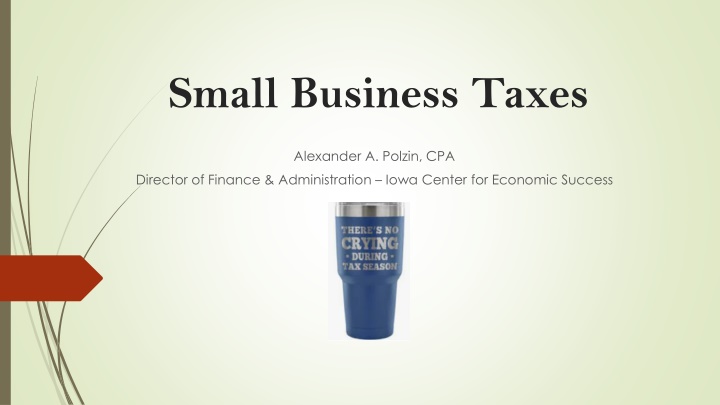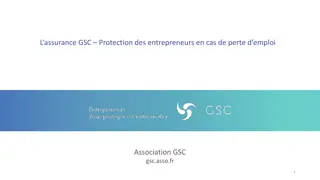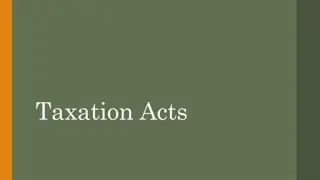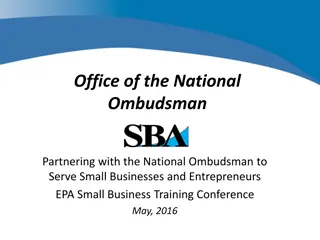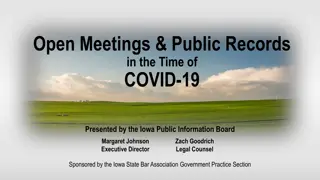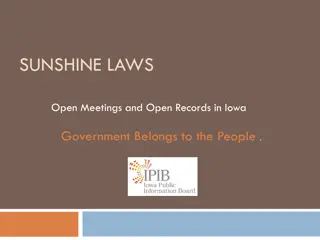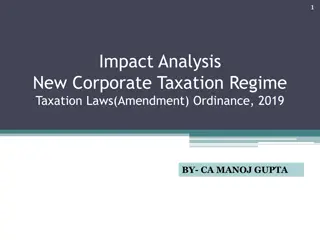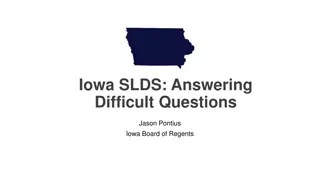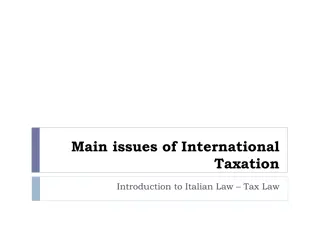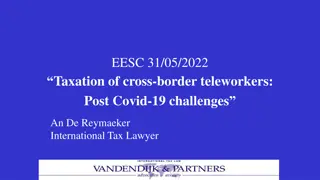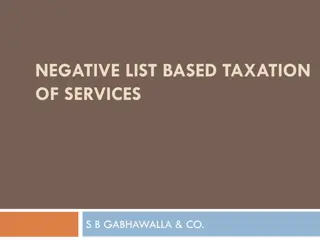Small Business Taxation Overview for Iowa Entrepreneurs
Discover key steps for starting your business with a tax focus in Iowa, including business structure determination, EIN acquisition, tax treatment selection, eligibility for S-Corp status, and tracking financial metrics. Learn about different types of small business taxes, such as federal and state income tax, payroll taxes, and other business-related taxes. Understand the taxation of flow-through entities like sole-proprietorships and S-Corporations, with insights on reporting requirements, tax rates, and benefits or drawbacks.
Uploaded on Nov 25, 2024 | 2 Views
Download Presentation

Please find below an Image/Link to download the presentation.
The content on the website is provided AS IS for your information and personal use only. It may not be sold, licensed, or shared on other websites without obtaining consent from the author.If you encounter any issues during the download, it is possible that the publisher has removed the file from their server.
You are allowed to download the files provided on this website for personal or commercial use, subject to the condition that they are used lawfully. All files are the property of their respective owners.
The content on the website is provided AS IS for your information and personal use only. It may not be sold, licensed, or shared on other websites without obtaining consent from the author.
E N D
Presentation Transcript
Small Business Taxes Alexander A. Polzin, CPA Director of Finance & Administration Iowa Center for Economic Success
Starting your business (tax focus) Determine business structure & register business with Iowa Secretary of State Legal Zoom for single-member LLC formation Obtain your federal Employer Identification Number Form SS-4 online application https://www.irs.gov/businesses/small-businesses-self-employed/apply-for-an-employer-identification-number- ein-online Determine desired tax treatment (Sole-Proprietor, Partnership, S-Corp, C-Corp) Election to be taxed as an S-Corp filed with IRS Form 2553 https://www.irs.gov/pub/irs-pdf/f2553.pdf STOP - Is your business eligible for S-Corp status? Open a business bank account Begin tracking revenue, expenses, capital contributions & distributions, fixed assets, etc.
Types of Small Business Taxes.. Federal & state annual income tax Flow-through entity net income taxed at your individual income tax rate C-Corp net income taxed at flat tax rate of 21% and is its own standalone legal entity Double taxation when withdrawing funds as dividends Federal & state payroll taxes Federal withholding, state withholding, federal unemployment, state unemployment, Social Security & Medicare Self-employment taxes for sole-proprietors and partners in a partnership Employee + Employer social security & medicare (15.3%) Other business taxes: Sales tax, real estate taxes, other property taxes https://tax.iowa.gov/iowa-sales-and-use-tax-guide
Taxation of flow-through entities.. Sole-Proprietorship net income is generally reported on Schedule C of your individual form 1040 (Rental income on Sch. E & Farm income on Sch. F) Net Income is taxed at your individual tax rate while considering all other sources of income Most sole-proprietorship Net Income is subject to self-employment taxes at 15.3% No balance sheet required to be reported with tax return Pros: Minimal reporting requirements & limits the number of tax filings required for your business, tax-free distributions Cons: Net Income is generally subject in full to self-employment taxes, other legal considerations
Taxation of flow-through entities.. S-Corporation income and deductions are reported on form 1120S Tax treatment as an S-Corp must be elected by filing form 2553 Net Income of an S-Corp flows to tax payer and is taxed at their individual tax rate on their form 1040 Net income is NOT subject to self-employment taxes (15.3%) S-Corp owners are required to pay themselves a reasonable salary and withhold and pay the applicable payroll taxes throughout the year Excess income can be distributed out of the business to yourself tax-free Pros: Avoid some payroll taxes, stronger reporting of financial information to the IRS is generally less likely to be audited than a Sch C, more transparent, S-Corp credit in Iowa, tax-free distributions. Cons: More reporting requirements with 1120S, overall more tax filings (1040, 1120S, payroll filings), contributions and distributions should always match ownership %
Taxation of flow-through entities.. Partnership income and deductions are reported on form 1065 Multi-member LLC business income must be reported on form 1065 unless form 2553 is filed to elected tax treatment as an S-Corp (some exclusions to this rule for businesses owned by spouses or other family members) Net Income of a partnership flows to taxpayer and is taxed at their individual tax rate on their form 1040 Net income is subject to self-employment taxes (15.3%) Tax-free distributions Only ordinary income is subject to SE tax; passive rental income is not subject to SE tax making a partnership a good option for Rental Real Estate businesses Pros: Additional transparency and accuracy due to reporting requirements. Partnerships are audited at a very low rate. Partnerships can elect to be audited at the partnership level. Tax-free distributions. Partnerships can make un-even partner contributions & distributions if allowed by operating agreement. Cons: Operating income is subject to income tax and self-employment tax for most active partners
Internal Revenue Service Tax Forms IRS Form 1040: https://www.irs.gov/pub/irs-pdf/f1040.pdf IRS Schedule C (Sole Prop.): https://www.irs.gov/pub/irs-pdf/f1040sc.pdf IRS Form 1120 (C-Corporation): https://www.irs.gov/pub/irs-pdf/f1120.pdf IRS Form 1120-S (S-Corporation): https://www.irs.gov/pub/irs-pdf/f1120s.pdf IRS Schedule K-1 (Form 1120-S): https://www.irs.gov/pub/irs-pdf/f1120ssk.pdf IRS Form 1065 (Partnership): https://www.irs.gov/pub/irs-pdf/f1065.pdf IRS Schedule K-1 (Form 1065): https://www.irs.gov/pub/irs-pdf/f1065sk1.pdf IRS Payroll and other Taxes: Form 941, 940, W3, W2, 1099-Misc, 1099-NEC
Estimated Taxes Small business owners are required to pay taxes throughout the year, just like W2 employees do through withholdings and employer tax deposits Form 1040-ES provides 4 quarterly vouchers for estimated tax payments These estimated tax amounts are projected based on expected net income from your small business and other sources
General observations from the small business tax world.. Keep all receipts, bank statements, financial statements, tax returns for 7+ years Try to stay up-to-date recording your transactions and maintain an organized accounting system this will make tax time much less painful! Don t avoid financial issues (i.e. IRS or state agency tax notices) Know your accounting pain threshold and seek out assistance when required (You can do a lot on your own, but do you want to?) Do not co-mingle personal and business funds separate the accounts and stick with it! Pay all trustee taxes that you owe timely (these would include sales taxes that you charge your customers or taxes you withhold from employee paychecks.) Remember the money you collect for sales tax, for example, is the state s money) It s simply not worth pushing it with these tax agencies - keep things above board and sleep easy knowing your are in compliance with the IRS, Iowa Department of Revenue, and all other agencies your business reports too.
